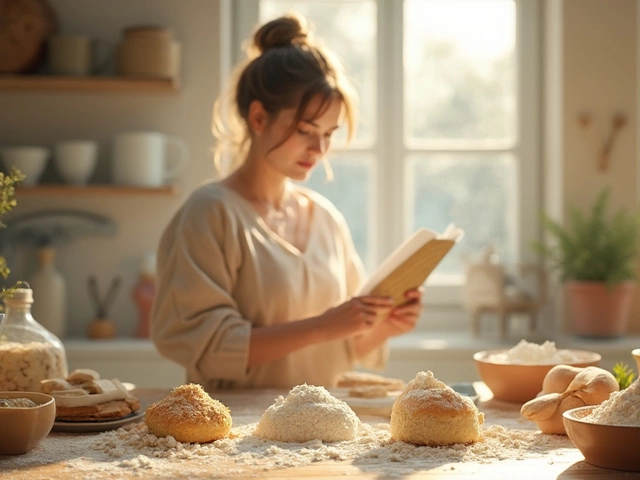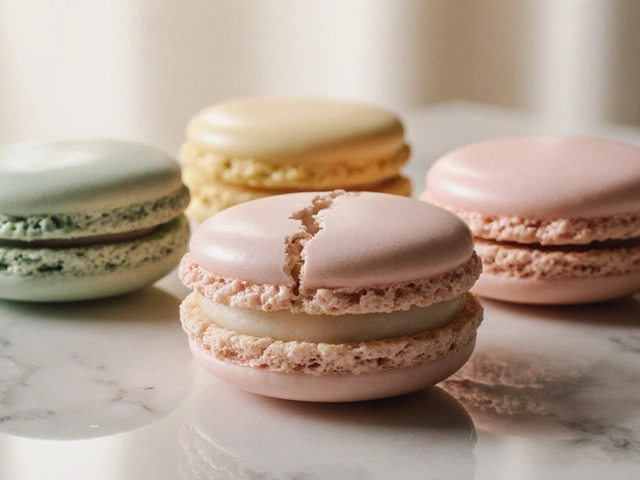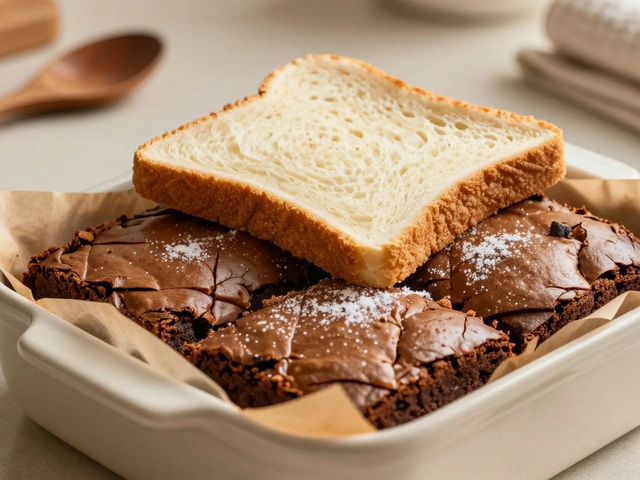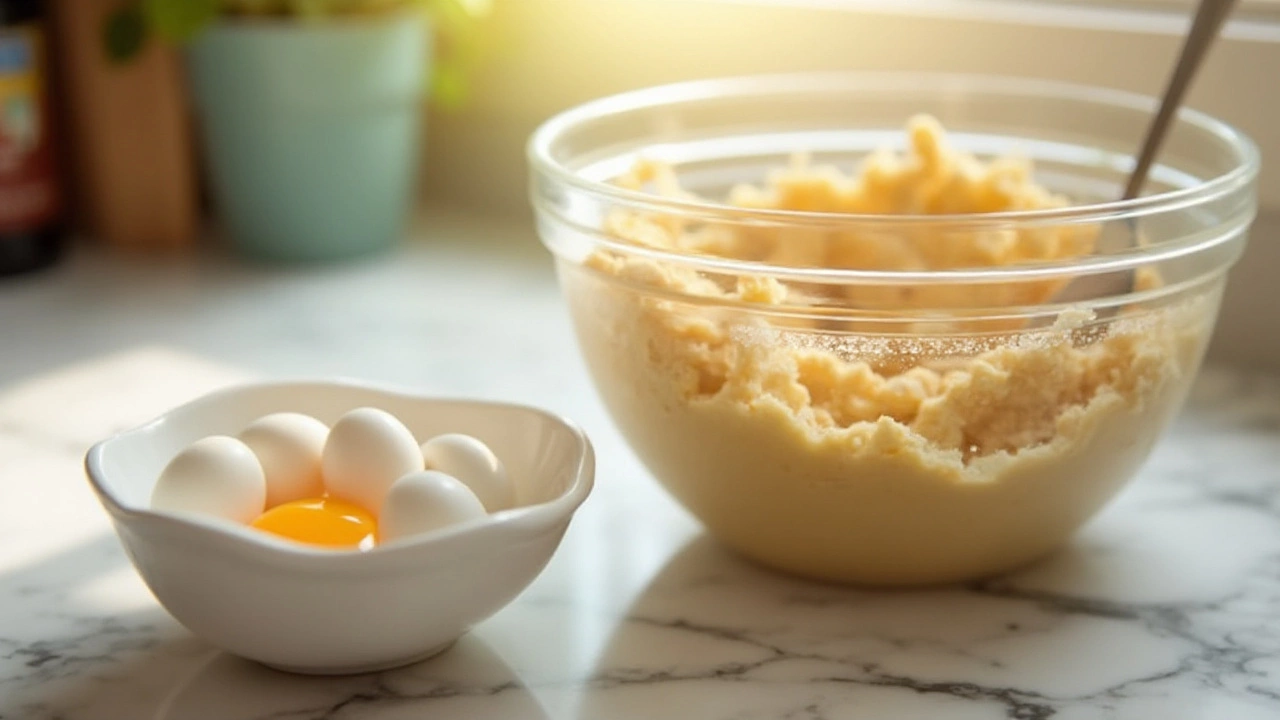
Picture the warmth of a busy kitchen, where the comforting scent of cookies fresh out of the oven fills the air. It's in that comforting environment where cookie baking transitions from a simple activity to an art form, sparking curiosity about every little detail, including the role of the egg.
In cookie recipes, a typical question arises: What happens if whole eggs replace the specified egg yolks? It's a small twist in the ingredients list, but it unfolds layers of interesting outcomes, each morsel telling a story of chemistry and creativity.
Embarking on this culinary exploration may change not only how cookies delight your taste buds but also how they look and feel. With some delightful adjustments and simple experimentation, using whole eggs can lead to scrumptious revelations straight from your oven.
- The Role of Eggs in Baking
- Benefits of Using Whole Eggs
- Texture and Flavor Differences
- Common Missteps and Solutions
- When to Choose One Over the Other
- Creative Recipes for Whole Egg Cookies
The Role of Eggs in Baking
Eggs are an essential component in many baking recipes, a quiet yet powerful ingredient that brings a multitude of functions to the table. In baking, eggs are often seen as the binding agent, holding ingredients together with their unique properties. Their versatility is part of what makes them so indispensable, as they contribute to everything from the color and texture to the flavor and structure of baked goods. Eggs also add richness to cookies, with the yolk providing fat that lends itself to creating a tender crumb. The whites, on the other hand, are responsible for aeration, giving cookies their lightness through the incorporation of air during mixing. The dual-action of yolk and white makes eggs a culinary marvel that transforms simple mixtures into delightful treats.
More than just texture, eggs also play a significant part in the chemical reactions that occur during baking. The proteins in eggs coagulate when heated, setting the structure of the baked goods and ensuring they hold their form once out of the oven. This is vital in cookies, where you need that balance of chewy and structured. Though many might not give it much thought, if you’ve ever wondered why cookies brown so beautifully, you can thank the eggs. They help with the Maillard reaction, a chemical reaction between amino acids and reducing sugars that adds a golden hue and a depth of flavor only adequate browning can achieve. This chemical dance is one reason why cookies appeal not just to the taste buds but to the eye as well.
Sometimes described as the “workhorse of the kitchen,” eggs can actually vary widely in their impact depending on their form and the context in which they’re used. This becomes particularly interesting when considering the outcome with whole eggs versus just yolks. Whole eggs can make cookies fluffier, almost cake-like, offering a lighter bite. This is attributed to the water content common in egg whites, which tends to create steam during baking, lightly lifting the dough.
“The egg is compact; not of much bulk, yet it embraces the principles of life and nourishment for man.” — Jean Anthelme Brillat-SavarinWithin this compact shell lies the key to myriad delicious creations.
Incorporating eggs correctly into baked goods, such as cookies, requires understanding the subtle yet impactful change brought on by their particular properties. If cracking an egg into a bowl feels too mundane, it might be enlightening to remember you're handling a little parcel of culinary potential. It’s also important to consider the role of eggs in balancing moisture. With simple guidance, this dynamic ingredient can elevate the simplest cookie recipe to gourmet status. And this magic happens in just about every batch of cookies, making eggs a beloved and essential staple in kitchens around the world.
Benefits of Using Whole Eggs
In the enchanting world of baking cookies, the choice between using whole eggs or just yolks can often dictate the final texture and taste. Whole eggs play a significant role by adding moisture and richness to the dough. The egg whites included in whole eggs contribute water and protein, giving cookie recipes added moisture. This not only aids in creating a cakey and soft texture but also helps in even cooking, offering a bounty of rich flavor in every bite. On the other hand, the yolk imparts a rich, buttery taste due to its high fat content, meaning when you include whole eggs, you get the best of both worlds: the richness from the yolk paired with the volume and lightness from the whites.
One striking advantage of using whole eggs is the leavening effect the whites offer. As you beat the mixture, proteins in the whites trap air, providing a lift that translates into airy, fluffier cookies. This is particularly beneficial for lighter cookie recipes like sponge cakes or any treat where a bit of rise is appealing. Beyond physical attributes, whole eggs bring another layer of flavor depth, rounding off sweetness with a hint of savory, making them a versatile ingredient that balances multiple taste profiles.
Simplification and Flexibility
Another great aspect of using whole eggs is simplification. When a recipe calls for whole eggs, the process is streamlined, removing the fiddly task of separating yolks from whites. It's less wasteful too—using the whole egg means there are no leftover whites lurking in the fridge, vying for attention before they spoil. This simplicity makes whole eggs a preferred choice for busy bakers or anyone seeking an uncomplicated baking session without compromising the end product’s quality. A true win-win scenario.
"A whole egg is a complete package of nutrients, offering protein, vitamins, and minerals essential for dietary balance," says a prominent food scientist.
This complete nutrient profile not only plays a part in our diet but also elevates the nutritional aspect of your homemade cookies. As such, they are more than just treats—they become part of a balanced snack, offering a modest contribution to your daily intake of protein, necessary fats, and trace elements.
Incorporating whole eggs doesn’t just entice your taste buds but also encourages experimentation. Perhaps you're skeptical, yet curious, about what a pinch of cinnamon and a handful of raisins could do to your tried-and-true recipe? The forgiving nature of recipes using whole eggs makes them perfect test grounds for such adventures. With these eggs, you unleash the potential for new flavors and textures that grandparents’ recipes might never have considered. Whole eggs, in their simplicity and goodness, truly open avenues of culinary creativity, providing myriad benefits worth exploring in any kitchen.
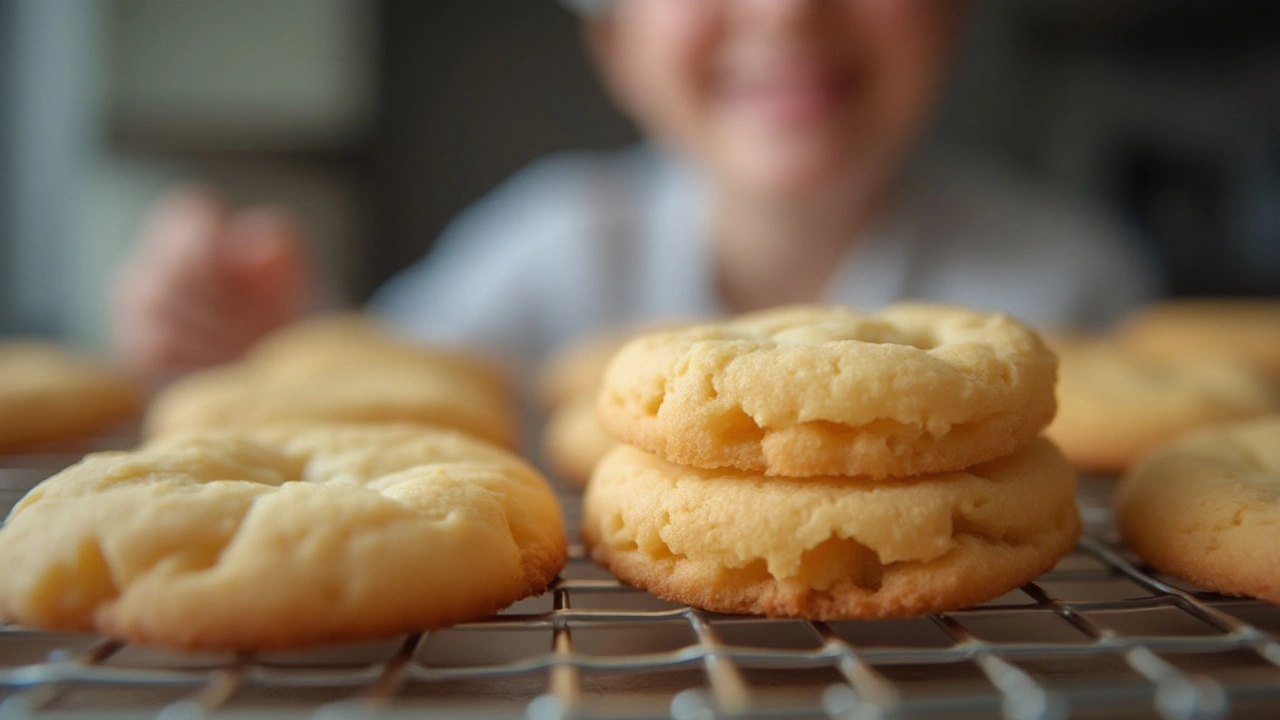
Texture and Flavor Differences
Diving into the world of cookies, a fascinating discovery unfolds when choosing to use whole eggs instead of the beaten path of just egg yolks. The heart of this exploration lies in the contrasting texture and flavor that whole eggs bring to your beloved cookies. Using whole eggs adds a certain fluffiness that many bakers crave, resulting in cookies that rise more and spread less during the baking process. This change occurs due to the whites in the egg, which integrate air into the dough, allowing for a lighter, more cakey texture contrasted starkly with the chewy density that yolks alone can bring. This pivotal distinction could be crucial for those seeking to alter the traditional heaviness into something a bit airier, offering a new perspective to the traditional cookie lover.
Beyond texture, the subtle nuances of flavor also evolve when whole eggs become the centerpiece. The increased moisture lends a slightly richer taste, enhancing the cookies' sweetness while toning down any overly buttery notes. This balance can be particularly appealing to those who find typical recipes overly rich or saccharine. According to renowned pastry chef Christina Tosi, "Whole eggs bring a harmonious blend of moisture and flavor that transforms baked goods into a delightful experience." These adaptations come without losing the quintessential cookie essence; they merely add layers, quite literally, to the tasting experience.
Experimenting with whole eggs does not limit itself to texture alone; the aroma and visual appeal take new directions as well. Cookies incorporate a slightly golden hue, attributed to the egg yolks, paired with a glossy finish from the whites, creating externally enticing treats. It's a visual signal that invites anyone into the kitchen, ready to taste the new symphony of flavors. The inevitable adjustments in texture may influence how ingredients interact, prompting an improved softness where chewiness once dominated. This fascinating shift could become the secret ingredient that your cookie jar has been missing all along.
To further illustrate, envision a batch of chocolate chip cookies tweaked with whole eggs. Such a simple modification turns them into soft pillowy delights that appeal to the senses in novel ways, a pleasure for any cookie enthusiast to explore and enjoy. Additionally, one might find that whole eggs introduce a consistent texture throughout each batch, minimizing the risk of an unpredictable bite due to the unmistakable presence of cohesive structure every time. Each cookie radiates the warmth and uniqueness of homemade food adventures, being perfect candidates for those family moments where baking memories become aromatic dreams, one soft, whole-egg cookie at a time.
Common Missteps and Solutions
Baking is as much a science as it is an art. When you swap egg yolks for whole eggs in your beloved cookie recipes, a few unexpected issues can crop up. One of the most common troubles bakers encounter is dealing with unexpectedly cakey or fluffy cookies. This can be a letdown if you've set your heart on those classic chewy, dense cookies. The primary culprit here is the additional moisture and air that whole eggs introduce into the batter. While they contribute to a lovely rise and puffy texture, this isn't always the goal for every cookie lover. To tackle this, try reducing other wet ingredients slightly, like butter or milk, to strike a balance and keep the moisture content in check.
Another hiccup is the spread of your cookies. Whole eggs might lead to cookies that flatten more than anticipated, losing that picture-perfect roundness. This is due to the protein in egg whites, which helps the dough spread out more. You can counteract this by chilling your dough before baking or adding just a pinch more flour than the recipe calls for. This extra step ensures the structure holds while baking, keeping your cookies in delightful shape.
"Baking is unlike almost everything else we undertake today. We can't rush it just as we can't slow it down. We can't skip steps, and we can't triple the portions without consequence" - Dorie Greenspan, Baking Legend and Cookbook Author.
A surprising issue may arise with flavor, as whole eggs can sometimes overshadow the other ingredients, especially those subtle notes from vanilla or a hint of almond extract. If you're noticing a more pronounced eggy flavor, consider enhancing your sweeteners or extracts slightly. This could mean a dash more vanilla or a teaspoon extra of sugar. Your cookies should still shine with that vintage, sweet aroma regardless of these small new adjustments. Also, when slightly adjusting ingredient quantities, remember to maintain the balance of your seed or nut additions, as whole eggs may alter how these stand out in terms of texture.
Finally, there's the potential for color variations. Cookies made with whole eggs might emerge with a paler hue compared to those made solely with yolks. If you're seeking that golden-brown finish, placing your cookies a rack higher in the oven can encourage a gentle caramelization. Alternatively, a minute or two longer in the oven may do the trick without sacrificing moisture or risking burning.
Baking cookies is a delightful process fraught with small lessons, each batch teaching something new. With these solutions, turning your potential cookie slip-ups into delicious moments of learning becomes as much fun as devouring the warm delights fresh from the oven. There's nothing quite like perfecting recipes and sharing them amidst the family chaos, as my little ones, Dariel and Thalia, often remind me with their endless enthusiasm and their not-so-silent opinions on cookie texture.

When to Choose One Over the Other
Making the decision between whole eggs and egg yolks in your cookie recipe is much like choosing the path for a culinary journey, each leading to delightfully different destinations. This choice often depends on what exactly you're looking to achieve with your homemade cookies. If you’re dreaming of cookies that are crisp and have a deep, rich flavor akin to a cookie you'll savor slowly with a cup of coffee, egg yolks are the go-to. They lend a richness that heightens both flavor and that soft yet crumbly texture that luxurious cookies are known for. Yolks are predominantly fat, which helps to shorten or tenderize baked goods.
Conversely, if your heart is set on baking cookies that are light, fluffy, and a bit more substantial in terms of size, whole eggs would be the stars of your recipe. The whites in whole eggs act as a leavening agent because they trap air, giving a rise to your baked goods that pure yolk recipes typically miss out on. This characteristic is why cakes often rely on whole eggs—providing the airy structure needed. For instance, in chocolate chip cookies where you crave a soft and lofty bite, the use of whole eggs will transform the usual into something less dense and more pliable.
Considerations and Preferences
Certain occasions lend themselves better to one choice over the other. For example, when making a batch of cookies to bring to a summer picnic, you might opt for the flatter, denser yolk-only cookies. These will hold their shape better and withstand the warm weather without becoming too delicate to handle. On the other hand, for a cozy winter's evening at home, where you wouldn't mind savoring a chewy, soft cookie that's slightly puffy, whole eggs would be preferable. Preferences alone might drive the decision, or it might be worthwhile to experiment depending on your pantry stock.
"Eggs are the most protean of sources. They can remain firm yet fluid, offering both stability and leavening." — Harold McGee
The nuances of cookies recipes can be as precise or as forgiving as one’s willingness to experiment allows. Some bakers enjoy the adventure of trial and error, learning what aligns best with personal taste. A practical tip before choosing which egg variant to use is to consider the moisture content desired in the end product. Egg whites contain more water than yolks, thus integrating them into your mixture might warrant adjustments in other liquid ingredients to maintain proper dough balance. Another fact worth noting is that while whole eggs can aerate, they also water down flavors unless complementary extracts or spices are used in conjunction.
Creative Recipes for Whole Egg Cookies
In the realm of baking, where tradition often meets innovation, the use of whole eggs in cookies can transform a classic treat into something refreshingly new. Introducing whole eggs into cookie recipes invites a collection of delightful differences that make the baking process both experimental and rewarding. Whole eggs impart a unique texture and moisture that can surprise even seasoned bakers, leading to softer, fluffier confections that melt in the mouth. This subtle toque and its effect on the baking chemistry provide a chance for unveiling new favorite cookies that could become staples at family gatherings or cozy afternoons.
Before diving into the recipes, it's important to remember that baking cookies with whole eggs might alter their classic consistency, making them more akin to little cakes rather than the chewy bites one might expect. Here’s where some creative thinking comes into play: consider the range of flavors and ingredients that can complement the distinctive texture. Incorporating ingredients like oatmeal, chocolate chips, or even spices such as cinnamon and ginger can add depth and complexity, creating layers of flavor that wholly satisfy and delight the senses.
An inspiring recipe worth trying is the Whole Egg Chocolate Chip Cookie. Start by creaming together a mix of butter and sugars—white and brown for a richer, deeper taste. Then, beat in the whole eggs to infuse the batter with that essential moisture and fluffiness. Add vanilla extract for a fragrant aroma that will soon fill your kitchen. Gradually blend in dry ingredients including flour, baking soda, and a pinch of salt. The magic touch comes when you fold in a generous handful of chocolate chips, ensuring each cookie bursts with gooey sweetness. Bake these delectable rounds at a moderate temperature until they are golden brown, enjoying the warm blast of chocolate as it greets you from the oven.
According to King Arthur Baking, a trusted source in the culinary world, "Eggs add structure, leavening, color, and flavor to our cakes and cookies."
It's fascinating how adding whole eggs as opposed to just egg yolks can introduce a whole new dimension to baked goods. Adjustments in the ingredients or preparation can yield entirely different outcomes, leading us to uncover serendipitous culinary discoveries.Don't be afraid to explore other ingredient combinations too. The whole egg can be the gateway to imaginative cookies like lemon poppy seed or exotic spice-infused varieties.
Including a nutritional angle, incorporating whole eggs doesn't just affect the texture; it enriches the cookies with additional protein and essential nutrients. For those keeping track of dietary values, using whole eggs in your cookie recipes could offer a slight nutritional boost while indulging in sweet pleasures. A quick dive into the nutritional world reveals that one large egg contains about 6 grams of protein and is an excellent source of vitamins like riboflavin and vitamin B12.
To wrap up, dare to be bold, and let your imagination take the lead in the baking realm. Whole egg cookies beckon you to open the pantry door and see what new concoction will unfold. In the world of baking, there's no limit to what you can achieve when daring to deviate from the yolk, and embracing the whole egg. Why wait? Fetch your apron, those trusty mixing bowls, and taste the difference a whole egg can impart in the beloved cookie.

